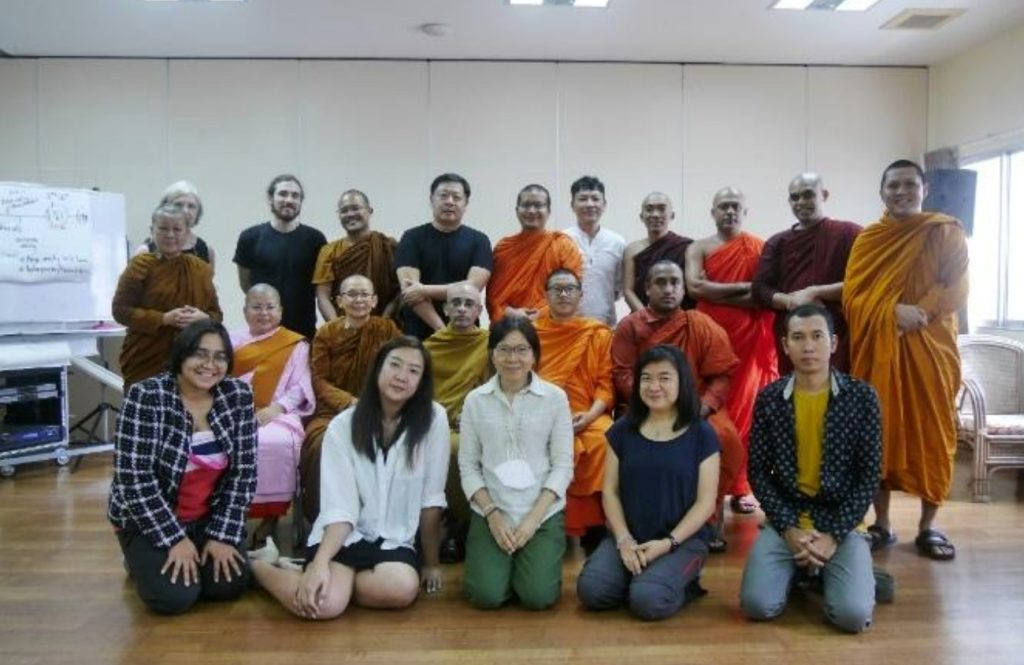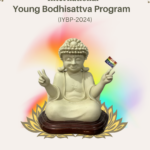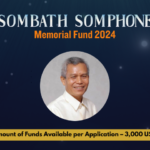
Regional Network for Peacebuilders Project (Sangha for Peace)
First Country Learning Mission, Thailand,
May 28 – June 5, 2022

The Regional Network for Peacebuilders Project (Sangha for Peace) conducted its first country learning mission in Thailand from May 28 – June 5, 2022. This was the culmination of many months of planning after the project cultivated relationships with country partners, selected the participants, developed the curriculum, and located safe spaces for learning together.
This project is a collaboration between the International Network of Engaged Buddhists (INEB), United States Agency for International Development (USAID) and FHI360. Regional Network for Peacebuilders (the Project) is a two-year project funded by USAID and is being implemented by FHI 360.
Overall Project Goal
To develop and nurture regional networks for peacebuilders, including a particular focus on women, that will strengthen national and regional efforts to promote inclusive intra- and interfaith dialogues in South and Southeast Asia.
Objective 1: To co-create, with country partner organizations, a regional learning community arising from a shared learning experience of cross-country intra- and interfaith exchanges. (Although the project has three objectives, only the first objective applied to the first country learning mission.)
Country Learning Mission’s Learning Objectives:
At the end of country learning missions, the participants will be able to:
- have comprehensive understanding of the role Buddhism can play in conflict resolution and peacebuilding
- have an awareness of gender equality and social inclusion (GESI) and apply these knowledge and skills in local contexts
- formulate concrete activities for project implementation to promote peaceful co-existence within their communities
- develop a long-term strategic plan for regional network of peacebuilders
As an experiential learning platform, the project is designed to increase the participants’ understanding as key peace influencers within Buddhist communities in Myanmar, Sri Lanka, and Thailand, as well as enhance their capacity to engage at the regional level. The 15 selected participants (Myanmar 4; Sri Lanka 4; and Thailand 7) are moderate Buddhist leaders, male and female, ordained and laypersons, in each country that bring unique backgrounds to peacebuilding. The intensive interactive learning experience helped the participants form a learning community where they critiqued what they learned during the country learning mission. They will continue the learning journey together during the next two country learning missions.
Now, following the first country learning mission, the project has gained momentum after a slow start with the COVID-19 pandemic delaying its implementation. Fortunately, the project was supported by the FHI360 team who very flexible and understanding which helped adapt to the changing conditions. The participants’ energy and project designs also have added momentum which is bringing the project forward. Yet we recognize that the participants will face a different reality returning to their home communities where they want to introduce the new concepts and ideas learned through their project designs.
During the seven days the participants were emersed in the curriculum which was comprised of 5 modules: Buddhism, peace and violence; Inter and intra-faith dialogue for peaceful coexistence; GESI – Gender Equality and Social Inclusion; Community Engagement for Sustainable Peace; and Peace in Action. These same modules are the basis for the curriculum in the two forthcoming country learning missions. The modules took place in several ways including during an intensive interactive GESI workshop, by inviting visiting lecturers on specific topics relevant to the modules, and on-site exposure visits. The intensive GESI workshop was strategically presented first which helped the participants to get to know each other, and themselves through understanding the power dynamics, and make the connection between self-awareness and social change.
By the end of the first morning session the participants expressed how much they were looking forward to the learning mission. With this readiness and optimism, the participants were quickly forming a learning community. At the end the participants were preparing to return to their home countries where they would begin implementing their project designs.
Several types of follow-up activities will be conducted after the 1st country learning mission. First, the project coordinator will be following-up with the participants both individually and with the entire group which includes being updated on the implementation status of their individual project designs. The project is also looking at whether funding is available to support the participants’ project implementation and activities.
The project team is preparing for the next country learning mission in Sri Lanka and revising the curriculum to include the feedback given by the participants. One particular observation regarding the modules was how to balance the content when making transitions between workshops and site visits. This preparation also includes addressing other areas such as providing adequate translation for all participants.
For more information, please contact Surin Onprom, INEB Project Coordinator at [email protected]





